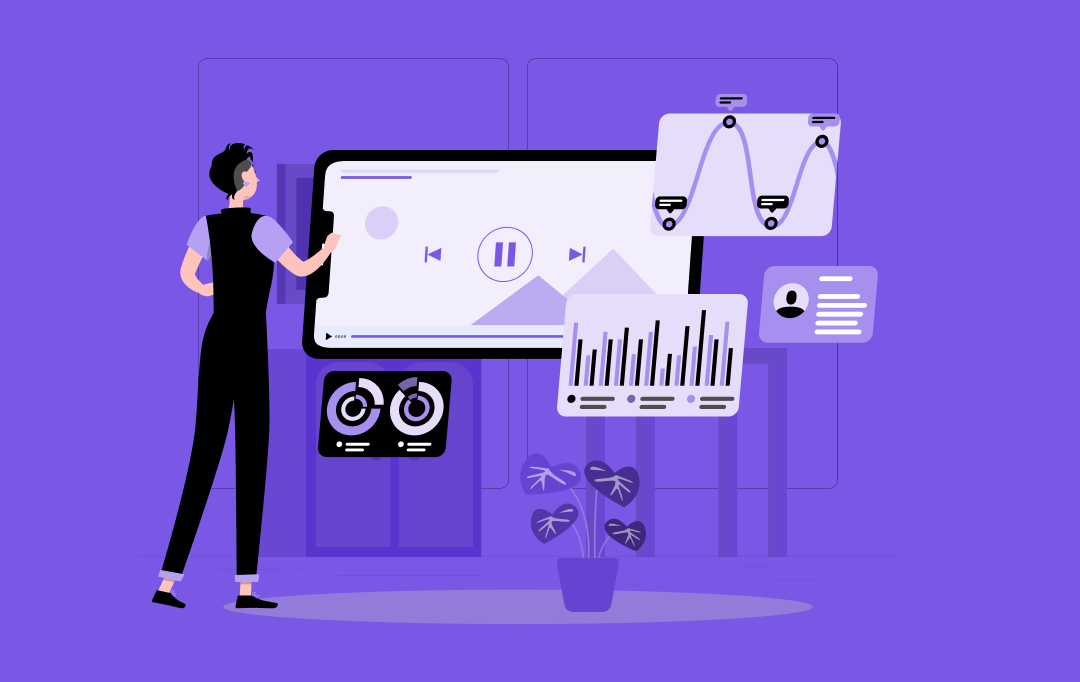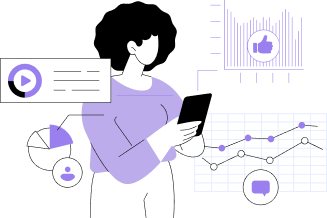- The Need for OTT Data Analytics
- 10 Reasons Businesses Should Have OTT Analytics
- Reveals What Content Drives Retention - Not Just Clicks
- Uncovers the Subtle Signals That Lead to Subscriber Churn
- Powers Deep Personalization That Keeps Users Hooked
- Builds a Catalog Based on Real, Evolving Demand
- Optimizes Ad Strategies Without Sacrificing Viewer Experience
- Brings Objectivity to Product and UX Improvements
- Acquires High-Lifetime-Value Users, Not Just Signups
- Empowers Real-Time, Responsive Operations
- Supports Localized Strategies as You Scale Globally
- Future-Proof Your Platform for What’s Coming Next
- Turning Insights Into Action
- Refine Content Strategy Based on Viewer Behavior
- Personalize the User Journey Across Touchpoints
- Optimize Marketing for Better LTV, Not Just CTR
- A/B Test Continuously
- Forecast Content Demand and Server Load Ahead of Time
- Inform Pricing and Monetization Decisions
- Feed Product Roadmaps With Actual Usage Data
- What to Look for When Building Your OTT Data Analytics Platform?
- Customizability That Matches Your Business Model
- Built to Scale - Without Scaling Your Costs Blindly
- Real-Time + Historical Analytics in One View
- Low-Code/No-Code Interfaces to Cut Dev Dependency
- Seamless Integration With Your Existing Stack
- Transparent Cost Structure With Room to Experiment
- Predictive, Not Just Descriptive
- Data Security and Compliance Built-In
- How Appinventiv Can Help You Build Smarter OTT Analytics
- FAQs
- Q. Why is OTT analytics important for businesses?
- Q. How does OTT analytics help businesses grow?
- Q. Why do businesses need OTT analytics in the digital world?
- Q. What are the challenges and solutions of OTT analytics in business?
- Q. What is OTT analytics?
Launching an OTT platform today is easier than ever, but scaling it? That’s where most businesses hit a wall. The competition is fierce, content costs are climbing, and subscriber behavior changes faster than your roadmap can keep up.
So what sets apart the streaming services that grow sustainably from the ones that fade into digital noise?
Data. But not just any data – actionable, granular, real-time OTT analytics for businesses.
It’s what helps you answer critical questions like:
- Which shows drive long-term subscriptions?
- Where in the viewing journey are users dropping off, and why?
- Are your ad slots generating revenue, or just filling space?
OTT analytics isn’t just about tracking views. It’s about shaping your business strategy with insight. In this article, we’ll explain why OTT analytics in businesses is no longer optional – and how it can fuel smarter decisions across content, marketing, and monetization.
The Need for OTT Data Analytics
Every view, skip, pause, or binge session tells a story. But without the right analytics framework, all of it stays buried – just raw, untapped potential. And in the OTT space, where margins are tight and viewer loyalty is fleeting, relying on assumptions can be costly.
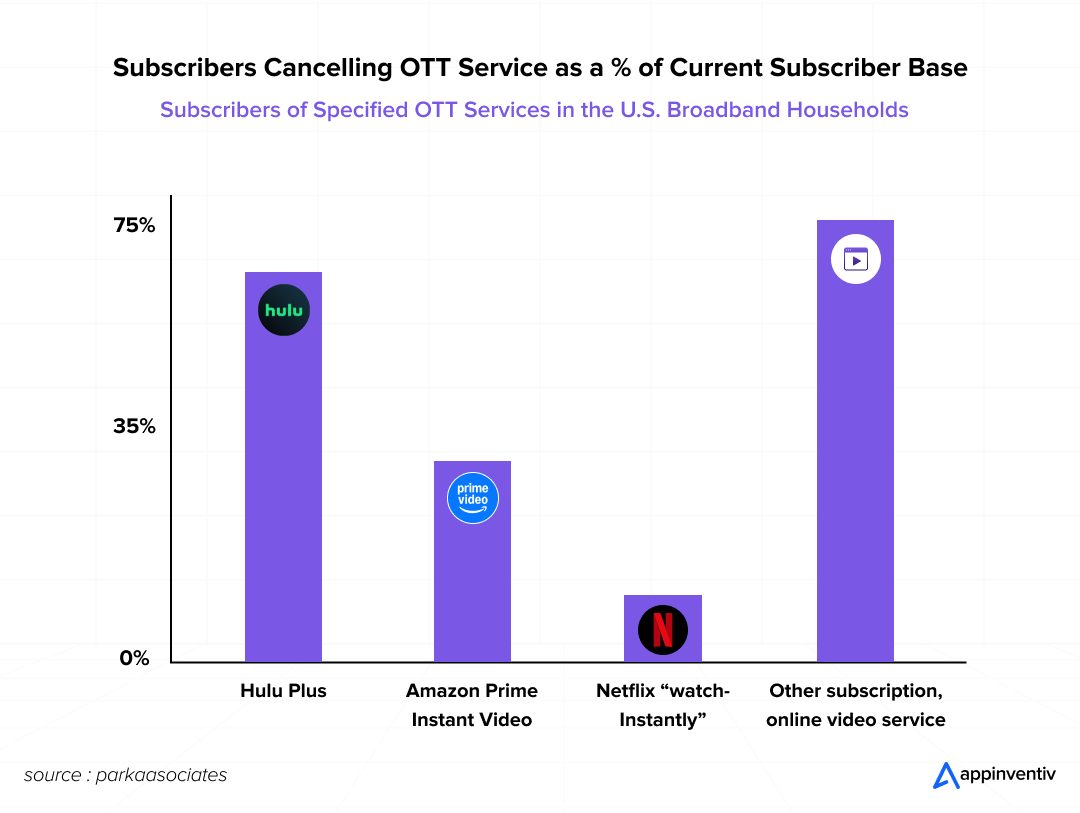
The landscape has shifted. We’re no longer in the era of passive TV watching. Today’s viewers are hyper-selective, easily switching between platforms and expecting personalized, frictionless experiences from the start. That shift, from mass broadcasting to micro-targeted consumption, demands a new kind of visibility. Many platforms still focus on content quantity or UI design, hoping that’s enough to hold attention.
But here’s the reality: decisions made without data are educated guesses at best – and expensive missteps at worst. A well-planned digital transformation with OTT analytics clarifies what most businesses are missing. It answers questions like:
- Is your free trial converting into paid subscribers, or churning within days?
- Which content segments drive watch time versus which ones kill momentum?
- Are your ad impressions generating actual value for partners, or just surface-level reach?
And it’s not just about post-launch tracking. Analytics informs everything from content acquisition and UI design to personalized recommendations and retention tactics.
As competition intensifies and audience expectations rise, analytics for OTT becomes more than a tool; it becomes your compass. It shows what’s working, what’s not, and where the real growth levers lie. Because in a space where user preferences evolve in real time, your business decisions should too.
To know more about what features you can add to your Custom OTT App during its development process, click here
10 Reasons Businesses Should Have OTT Analytics
Businesses can’t rely solely on view counts and subscriber numbers to succeed in OTT. Surface metrics may offer a glimpse into performance. Still, they often miss the deeper story – why users behave the way they do, what influences their loyalty, and how to evolve with their changing preferences. AI has transformed OTT streaming platforms with functionalities like OTT analytics in businesses, bridging that gap.
It uncovers actionable truths behind the numbers and turns everyday data into decisions that drive retention, revenue, and relevance. Here’s a closer look at ten reasons that establish the importance of OTT analytics in business, making it foundational.
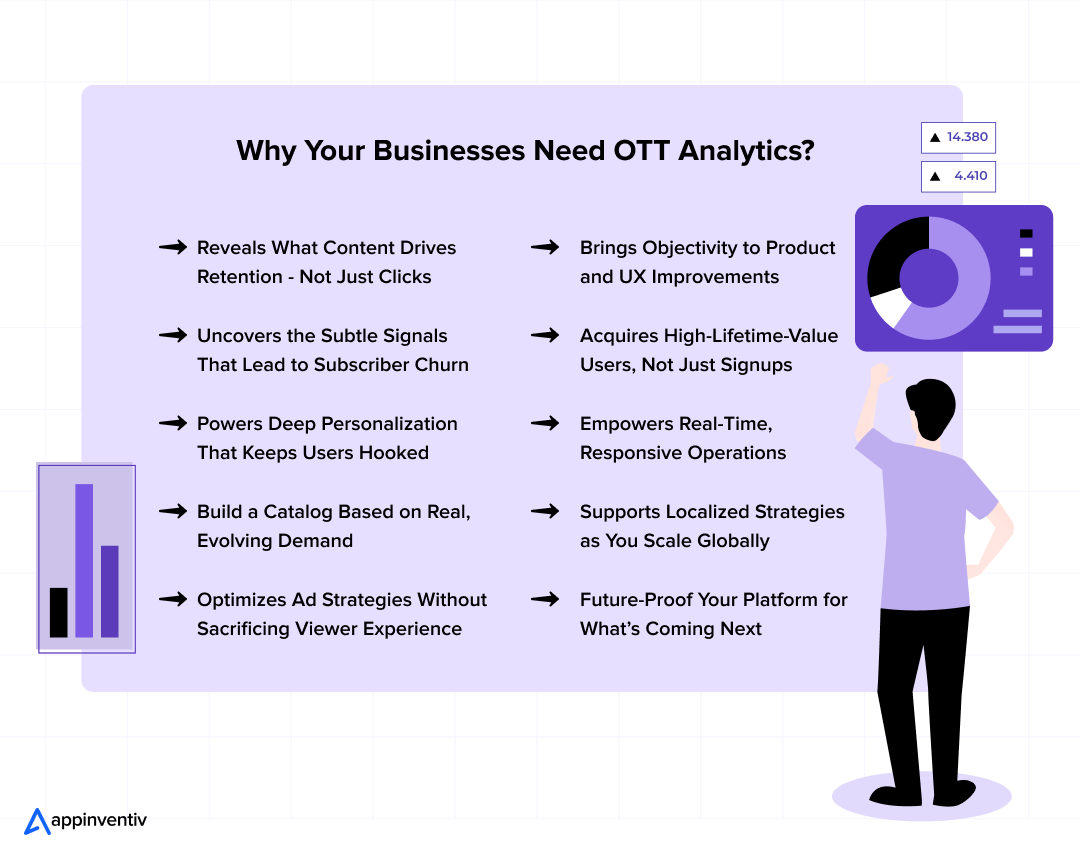
Reveals What Content Drives Retention – Not Just Clicks
A show might clock millions of views on launch weekend and still not move the needle on subscriptions. Why? Because clicks don’t equal loyalty. OTT analytics lets businesses dig deeper into completion rates, episode-wise drop-offs, and rewatch frequency to understand what content keeps people subscribed, not just entertained.
When retention is mapped against specific content clusters, businesses can prioritize investments that deliver long-term value. They can also stop funding “hype” and build a content library supporting recurring revenue.
Uncovers the Subtle Signals That Lead to Subscriber Churn
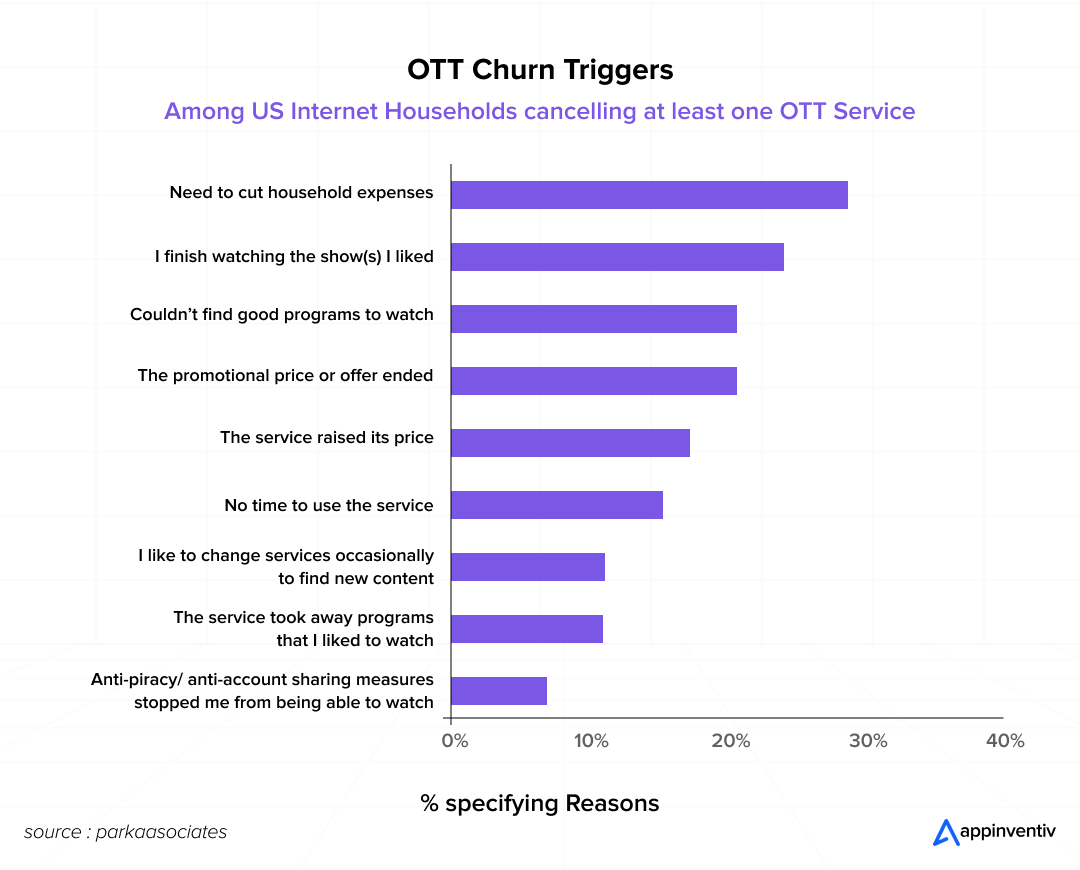
No one cancels their subscription on impulse. The decision often builds over time through subtle shifts in behavior: fewer logins, shorter sessions, ignoring new content, or skipping through recommendations. The benefits of OTT analytics for streaming platforms lie in the fact that they surface these quiet exits-in-the-making.
When churn signals are recognized early, businesses can respond with personalized re-engagement journeys, exclusive previews, or feedback loops that make the user feel seen. These aren’t just customer service moves; they’re revenue-saving ones.
Powers Deep Personalization That Keeps Users Hooked
The modern OTT user expects to land on a homepage that “gets them” – from thumbnails to watchlist suggestions. Achieving that level of customization isn’t just about genres or actors. It’s about understanding intent and timing.
With behavior-level insights – like weekday vs. weekend viewing, preferred session length, binge velocity, or skip frequency – OTT analytics plays a role in improving customer engagement with OTT analytics, helping build nuanced profiles. That data feeds into everything from smarter recommendations to targeted push notifications that are less likely to annoy and more likely to convert.
Bonus Read: How to Build a Push Notification Strategy For Higher Conversions
Builds a Catalog Based on Real, Evolving Demand
You don’t just want content that performs; you want content that compounds. What trends are rising quietly in the background? What underperforming genres might be breakout hits if given the right push? Analytics helps answer those questions.
OTT analytics for digital businesses can track search terms with low content matches, map underserved audience segments, and monitor how demand shifts across seasons or events. Over time, your content pipeline becomes more predictive, less reactive, and more profitable.
Optimizes Ad Strategies Without Sacrificing Viewer Experience
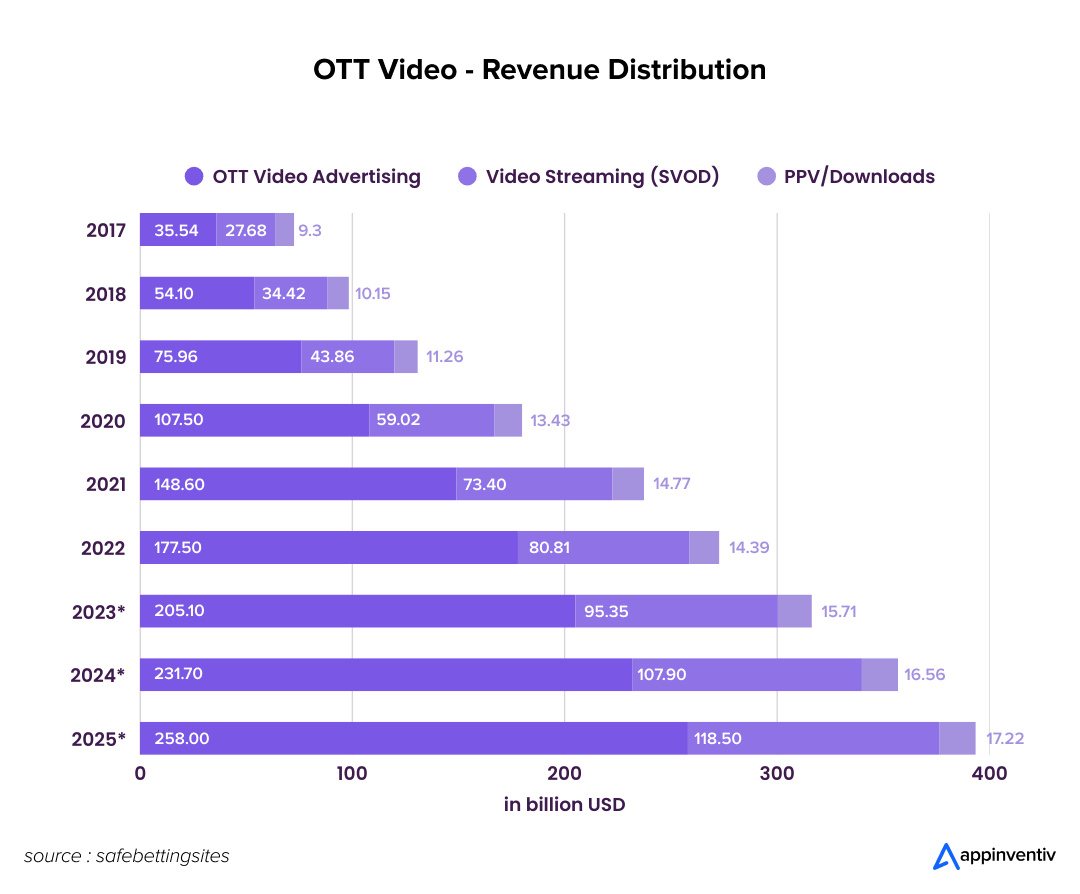
In ad-supported models, there’s always a risk: the harder you push ads, the more you push users away. Analytics helps you find that balance. Which formats frustrate users? What’s the ideal frequency cap? Are there viewer segments that engage more with sponsored content?
By testing ad variables against retention, viewability, and click-through data, OTT analytics for businesses can personalize ad delivery just like they personalize content. It becomes possible to increase ad revenue without increasing user drop-off.
Brings Objectivity to Product and UX Improvements
Too often, UX decisions are driven by instinct or “what competitors are doing.” OTT analytics solutions introduce data into that conversation. Are viewers abandoning signup halfway through? Is the player too slow to load on certain devices? Which interface changes correlate with longer watch sessions?
Session replay tools, heatmaps, and event-level analytics help product and design teams move from guesswork to grounded decisions, transforming the platform experience from something usable to something addictive.
Acquires High-Lifetime-Value Users, Not Just Signups
A big marketing push might increase thousands of users, but what if most drop off after the trial? OTT video analytics connect acquisition data to post-signup behavior. You can measure which campaigns, geos, or channels lead to sticky, high-LTV users, and double down there.
Marketing teams gain clarity on cost per retained user, not just cost per click. Messaging gets sharper. Segmentation improves. And you end up spending your budget where it matters most, on users who’ll stay.
Empowers Real-Time, Responsive Operations
Imagine you’ve just dropped a new series, and suddenly viewership spikes in one region while buffering complaints rise in another. Without real-time analytics, you’re flying blind. With OTT analytics concerning video streaming protocols for businesses, you can instantly detect platform issues, regional surges, or device-specific problems.
Engineering teams can allocate bandwidth dynamically, support can respond to specific device outages, and content teams can promote alternate shows when one becomes unexpectedly popular. Real-time intelligence turns static platforms into agile ones.
Supports Localized Strategies as You Scale Globally
Going global isn’t just about translating interfaces – it’s about understanding cultural rhythms, peak viewing hours, preferred devices, and genre inclinations in each region. OTT platform analytics breaks that down at a granular level.
You’ll learn, for instance, that Latin American viewers binge more during lunch breaks, or that Southeast Asian users favor mobile-first formats. Armed with this, you can localize content and UI, revolutionize payment models with AI, and create marketing campaigns, creating a truly global product that feels personal everywhere.
Future-Proof Your Platform for What’s Coming Next
Subscription fatigue. Microbundles. Live-streaming add-ons. Blockchain-integrated payments. The OTT space is evolving fast, and businesses that wait for trends to settle risk falling behind. OTT analytics tools for businesses act as your early warning system.
You can A/B test new monetization models, track emerging formats (like vertical video or interactive content), and simulate pricing experiments with select cohorts through the OTT business model you build. This agility isn’t just about keeping up; it’s about leading the curve, backed by data instead of guesswork.
Turning Insights Into Action
Collecting data is only half the equation. The real value lies in applying those insights across content planning, product design, marketing, and overall business strategy. The most successful OTT platforms aren’t the ones with the most data; they’re the ones that know how to use it.
Here’s how OTT analytics in businesses can translate information into tangible, growth-driving moves:
Refine Content Strategy Based on Viewer Behavior
Use completion rates, drop-off points, and genre popularity to decide what to renew, what to retire, and where to experiment. Combine this with social sentiment and search trends for forward-looking content bets.
Personalize the User Journey Across Touchpoints
Let analytics inform personalized homepages, in-app recommendations, email campaigns, and push notifications. A viewer who loves short thrillers on weekdays shouldn’t be greeted with a 3-hour drama on login.
Optimize Marketing for Better LTV, Not Just CTR
Track which campaigns result in long-term users and which just inflate vanity metrics. Use that learning to refine acquisition channels, creatives, messaging, and onboarding flow.
A/B Test Continuously
Experiment with different subscription models, ad formats, feature placements, and UI tweaks. OTT analytics makes it easy to test in controlled cohorts before rolling changes out widely.
Forecast Content Demand and Server Load Ahead of Time
Predict peak traffic, schedule releases strategically, and allocate infrastructure dynamically – especially for live or exclusive drops. No more launch-day surprises or service crashes.
Inform Pricing and Monetization Decisions
Use viewing patterns, engagement depth, and churn predictors to test tiered pricing, microtransactions, or hybrid models. Align perceived value with actual consumption behavior.
Feed Product Roadmaps With Actual Usage Data
From platform responsiveness to in-app navigation and device-specific experiences, analytics can guide product improvements based on real user behavior rather than gut instinct.
What to Look for When Building Your OTT Data Analytics Platform?
Building an analytics engine for your OTT platform isn’t just a technical decision; it’s a strategic one. The right digital transformation with OTT analytics setup helps you grow smarter, move faster, and spend better. But without a clear understanding of what matters, it’s easy to end up with bloated dashboards, unused metrics, and costs that spiral out of control. Here’s what to focus on:
Customizability That Matches Your Business Model
Whether you run a freemium service, ad-supported platform, or premium-only model, your analytics solution should adapt to your operations, not the other way around. Choose a system that lets you define your KPIs, segments, and success metrics.
Built to Scale – Without Scaling Your Costs Blindly
Data volume grows fast in OTT, especially with high-concurrency streaming and cross-platform usage. Your analytics for OTT platforms need to scale with your audience, but that scalability should come with transparency. Whether building in-house or using third-party tools, look out for cost creep.
- A custom-built OTT data analytics platform can cost between $40,000 and $1,50,000 upfront, with ongoing monthly maintenance costs of $5,000—$15,000.
- Third-party tools often charge by volume, events tracked, monthly users, or sessions, ranging from $500 to $5,000+ per month.
For leaner teams, open-source and cloud hybrid models based on OTT analytics for digital businesses offer flexibility, but you’ll still need a budget for engineers and ops.
Real-Time + Historical Analytics in One View
You’ll want real-time signals for live content, time-sensitive decisions, and historical data for long-term planning. Investing in OTT analytics solutions that balance both keeps your decision-making agile without doubling your storage costs.
Low-Code/No-Code Interfaces to Cut Dev Dependency
Low-Code/No-Code is the future of application development. Entrepreneurs often face resource constraints, both in time and talent. An OTT video analytics platform that empowers non-technical teams to explore data and build reports saves you from overloading engineering resources (and your budget).
Seamless Integration With Your Existing Stack
Look for tools that plug into your current systems – your CDN, CRM, marketing tools, or content library – without needing expensive middleware or long setup times. Every hour spent forcing compatibility is a cost not just in money, but in momentum.
Transparent Cost Structure With Room to Experiment
Whether you opt for custom OTT app development cost or use a third-party tool, clarity on pricing tiers, overage charges, support fees, and roadmap costs is crucial. Ideally, look for platforms that let you prototype and experiment before locking into full deployments.
Predictive, Not Just Descriptive
Modern OTT business models need to think ahead. A solution that includes AI-powered insights, like churn prediction, viewer clustering, or content affinity models, can help you stay ahead of the curve. Just ensure these add-ons don’t come at an unsustainable premium.
Data Security and Compliance Built-In
With global regulations evolving, it’s costlier to bolt on compliance later. For your OTT business model, choose platforms that support encryption, data minimization, audit logs, and user privacy controls from the start.
How Appinventiv Can Help You Build Smarter OTT Analytics
Building a high-performing OTT platform analytics solution isn’t just about great UI or flawless streaming – it’s about understanding what your audience loves, when they leave, what keeps them coming back, and how content drives revenue. That’s where analytics becomes more than a dashboard – it becomes a competitive edge.
At Appinventiv, we’ve helped formulate OTT analytics for businesses, ranging from niche content startups to large-scale broadcasters, build robust, scalable, and insight-rich analytics solutions tailored to their exact business models. Our OTT platform development company team works across every layer of the stack, including:
- Custom analytics architecture built around your KPIs, not generic templates
- Real-time event tracking systems integrated with live-streaming infrastructure
- Data visualization tools that democratize insights across teams
- AI-powered modules for churn prediction, viewer segmentation, and content recommendation
- Optimized cloud infrastructure to handle data scale without ballooning costs
- Compliance-first data systems that keep you audit-ready from day one
Whether you’re building OTT analytics in businesses from scratch or looking to enhance an existing one, we help you integrate analytics that go beyond vanity metrics, analytics that move the needle.
Want to see what this could look like for your platform? Let’s connect now.
FAQs
Q. Why is OTT analytics important for businesses?
A. Because content alone doesn’t guarantee success, understanding how audiences interact with that content does. OTT data analytics help businesses measure engagement, viewer behavior, drop-off points, device preferences, and more. It turns raw viewing data into strategic decisions that improve retention, boost monetization, and guide future investments.
Q. How does OTT analytics help businesses grow?
A. It clarifies what’s working and what’s not. Through digital transformation with OTT analytics, businesses can personalize content recommendations, optimize ad placements, improve streaming experiences, and reduce churn. This contributes to better user satisfaction, higher lifetime value, and more sustainable growth.
Q. Why do businesses need OTT analytics in the digital world?
A. Today’s viewers are scattered across devices, time zones, and platforms. In a digital-first environment, you need real-time feedback loops to stay relevant. Analytics for OTT helps businesses stay responsive by surfacing user preferences, performance bottlenecks, and opportunities before they become problems.
Q. What are the challenges and solutions of OTT analytics in business?
A. Common challenges of OTT video analytics include handling massive volumes of data, integrating data from multiple sources (like mobile, web, and smart TVs), real-time processing, and ensuring privacy compliance.
Solutions include using scalable cloud infrastructure, adopting ETL pipelines for unified data, leveraging AI for insight generation, and working with partners who understand OTT’s tech and business side.
Q. What is OTT analytics?
A. OTT analytics solutions track, process, and analyze data generated by users interacting with over-the-top media platforms, like streaming services and apps. They monitor viewer retention, performance, ad impressions, and device usage metrics to guide better content, marketing, and platform decisions.


- In just 2 mins you will get a response
- Your idea is 100% protected by our Non Disclosure Agreement.

Top 10 OTT App Security Risks and How to Block Them
As the demand for on-demand content continues to surge, OTT platforms handle more than just high traffic; they manage vast amounts of user data, digital assets, and third-party integrations with significant security implications. What was once considered a niche service is now a critical infrastructure layer in the global media and entertainment landscape, making it…

10 Powerful Ways AI is Transforming OTT Streaming Platforms
OTT streaming platforms are revolutionizing how folks watch content, and artificial intelligence in OTT platforms is a driver behind this transformation. Global OTT subscriptions are expected to reach 1.7 billion by 2027; good content is no longer enough in such a crowded space. How smartly that content is tailored and delivered to each viewer counts.…

How Much Does it Cost to Build an OTT App Like Stan?
As our lives become increasingly intertwined with technology, the rise of Over-the-Top (OTT) apps has become an essential facet of modern entertainment. The media consumption landscape is evolving, with digitalization fundamentally altering how we engage with content. Traditional television gives way to a more flexible model where viewers can watch anything, anytime, and on any…






